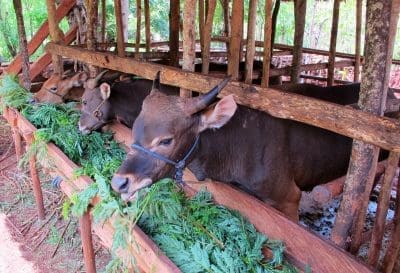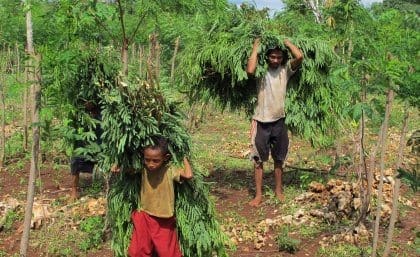INDONESIAN journalists recently visited The University of Queensland to hear about a successful cattle fattening project in their nation’s east which is bringing significant economic benefits for smallholder cattle farmers.
UQ School of Agriculture and Food Sciences researcher Associate Professor Max Shelton said the project involved more than 2000 farmers, who had planted one million leucaena plants to fatten cattle.
“It has trained 60 Government staff and 80 farmer leaders, and distributed 2000kg of improved leucaena fodder tree seed grown and sold by Indonesian smallholders,” he said.
Dr Shelton said the $1.777m project involved Australian and Indonesian research institutes.
“In essence, farmers in eastern Indonesia have planted a new UQ-released variety of leucaena in a project sponsored by the Australian Centre for International Agricultural Research,” he said.
“The farmers cut and fed it to their cattle, which got very fat as a consequence and were then sold for a profit.
“The project demonstrated that it is possible to greatly increase smallholder cattle productivity in Indonesia by improving nutrition with forage tree legumes.”
The variety of leucaena planted was Tarramba. Dr Shelton said it tends to be arboreal in habit (tends to grow tall with single stems), and requires height management in Australia, which is entirely possible, but it is not always well appreciated for that reason. However, it is perfect in Indonesia as it they like to harvest it high and manually at about 1.5-2m. This ensures its protection from smaller farm livestock.
 Dr Shelton said previous cattle fattening systems in Indonesia were characterised by poor carcase quality – largely because cattle were fattened under traditional smallholder feeding systems where they received insufficient protein.
Dr Shelton said previous cattle fattening systems in Indonesia were characterised by poor carcase quality – largely because cattle were fattened under traditional smallholder feeding systems where they received insufficient protein.
“The project aimed to lift the productivity of fattened cattle to meet the increasing demands of the Indonesian population, as an important way to improve the incomes of the rural poor,” he said.
Dr Shelton said greater use of forage tree legumes offered the best chance of providing high-quality protein supplements to cows on poor-quality diets, especially in the dry season.
The value of forage tree legumes had been demonstrated repeatedly throughout the tropical world.
“More than 200,000ha of leucaena pastures have been planted in Queensland to meet graziers’ needs for a highly productive and profitable system producing superior quality ‘grass-fed’ beef,” he said.
“This experience was used to promote the uptake of tree legumes in Indonesia.”
Dr Shelton said the project demonstrated that growing and feeding leucaena could halve the amount of labour needed to look after cattle – and double live weight gains.
“These impressive benefits are driving the adoption of the system,” he said.
“There is an opportunity to extend the use of this system to many thousands of smallholders in eastern Indonesia.”
The project collaborating partners included UQ, the CSIRO, Balai Pengkajian Teknologi Pertanian, (the Assessment Institute for Agricultural Technology, Indonesia); and Universitas Mataram (UNRAM), an Indonesian university; with field researchers in the Indonesian provinces of West Nusa Tenggara and East Nusa Tenggara.
In response to potential concerns from people involved in the Australian live cattle trade that this work may be undermining that industry, Dr Shelton said he believed the work was enhancing trade.
“We are not threatening the trade into Indonesian feedlots as our work was directed at the smallholder sector, and overall, Australian aid to the Indonesian cattle industry is building mutual trust and confidence.”
Source: Dr Max Shelton, University of Queensland

